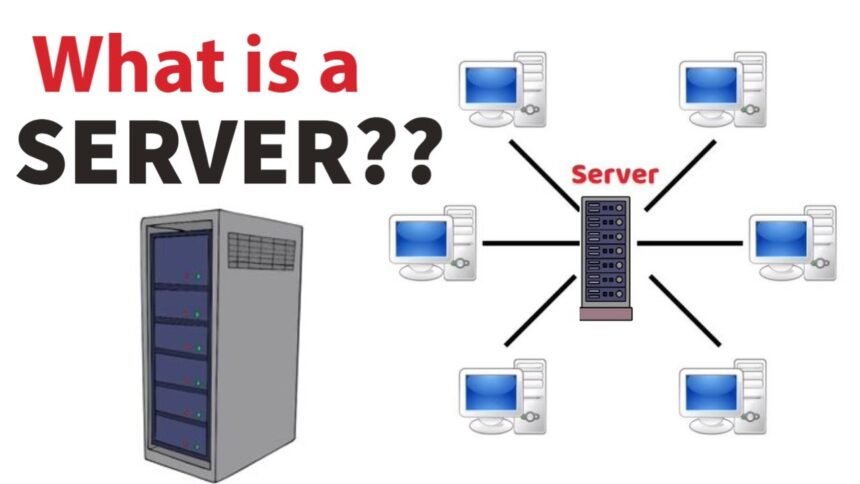When we think about the internet and the digital world, we often focus on the user-friendly applications we interact with—like websites, social media platforms, and cloud services. But what powers all of these behind the scenes? The answer is simple: servers. These machines handle vast amounts of data and make sure everything runs smoothly. In this article, we’ll break down what a server is, how it works, and why it’s so crucial for the modern world.
What is a Server? An In-Depth Look at the Core of Digital Networks
A server is essentially a computer, but one that’s optimized to manage, store, and distribute data over a network. Unlike your desktop, which is designed for individual use, servers are built to handle multiple requests from different users simultaneously. Think of them as the workhorses of the digital age—responding to requests, storing vast amounts of data, and keeping information flowing between users and devices.
Servers perform a wide variety of tasks, ranging from hosting websites to storing and processing large databases. They are critical for businesses, allowing employees to collaborate, share resources, and access important information no matter where they are. In short, servers make the internet—and everything else we depend on—possible.
How Servers Work: The Technology Behind Instant Data Access
At their core, servers operate by receiving requests and responding with the appropriate data. When you visit a website, your browser sends a request to a web server, which then responds by delivering the website’s content to your screen. This process happens in milliseconds, making it feel instantaneous to you.
Imagine a busy restaurant where the waiter takes orders (client requests) and brings out the dishes (server responses). The server (waiter) works behind the scenes, taking orders, getting the food from the kitchen, and delivering it to the table, ensuring that everything is delivered correctly and quickly. That’s essentially how a server operates in the digital realm—efficient, fast, and always ready to respond to new requests.
Desktop Computers vs. Servers: What Sets Them Apart
You might be wondering: isn’t a server just a more powerful desktop? While both desktops and servers share similar components—like processors, memory, and storage—they serve very different purposes. Servers are designed for durability, reliability, and handling multiple requests from different users at the same time.
Here’s the biggest difference: your desktop computer is built for personal use. You likely use it to browse the internet, play games, or write documents. A server, on the other hand, is built to run 24/7, processing tons of data from multiple users without breaking a sweat. Servers often come with features like redundant power supplies, enterprise-grade hard drives, and extensive cooling systems, all designed to keep them running smoothly even under heavy loads.
Think of it this way: if a desktop is like a family car, a server is a high-powered semi-truck, built to carry massive loads over long distances without breaking down.
Exploring Different Types of Servers and Their Roles
Servers aren’t a one-size-fits-all solution. Different types of servers are designed to handle different tasks. Here are some of the most common ones you’ll come across:
- Web Servers: These handle requests from browsers and deliver website content. Whenever you visit a website, a web server is hard at work behind the scenes.
- File Servers: A file server stores and manages files for multiple users. These are commonly used in office environments, where employees need to share documents and other data.
- Database Servers: These handle the storage and management of databases. If you’ve ever bought something online, a database server stored your personal information and processed your purchase.
- Mail Servers: Every time you send an email, it passes through a mail server, which ensures it gets to the right destination.
- Game Servers: Online gaming wouldn’t be possible without dedicated game servers that handle the interactions of players from all over the world.
- Cloud Servers: With cloud computing on the rise, cloud servers are becoming more popular. They host applications and store data remotely, allowing users to access everything they need from any device with an internet connection.
Each type of server plays a unique role in keeping our digital world running smoothly.
Key Components of a Server: What Powers the Backbone of the Internet
Just like a desktop computer, a server is made up of various hardware components, but each piece is optimized for efficiency and reliability. Let’s break down the key components that make a server such a powerful tool:
- CPU (Central Processing Unit): Servers usually have multiple powerful processors to handle large amounts of data quickly.
- RAM (Random Access Memory): The more RAM, the better a server can handle simultaneous requests. Servers are equipped with significantly larger amounts of RAM than desktop computers to manage heavy workloads.
- Storage (Hard Drive or SSD): Servers need massive amounts of storage to hold data for all the clients they serve. They often use specialized, high-reliability storage solutions like RAID arrays to prevent data loss.
- Network Interface: Servers are always connected to a network, so they need a fast and reliable network interface card (NIC) to ensure that data moves quickly and smoothly.
- Power Supply: Most servers have multiple power supplies, ensuring they stay operational even if one fails.
Choosing the Right Server: Factors to Consider for Your Needs
Choosing the right server depends on your specific needs. If you’re running a website, a web server is an obvious choice. If you need to manage large amounts of customer data, a database server is essential.
Small businesses might start with basic file or mail servers, but as they grow, they may need to upgrade to more complex setups. It’s also essential to think about scalability. Will your server be able to handle more users in the future? And don’t forget about security—your server will store sensitive data, so investing in robust security measures is a must.
The Role of Servers in Everyday Life: More Than Just Storage
Whether you realize it or not, servers are everywhere in your daily life. When you check your email, you’re using a mail server. When you post a photo on social media, it’s stored on a file server. Even when you stream a movie or play an online game, servers are doing the heavy lifting behind the scenes.
Without servers, modern conveniences like online banking, cloud storage, and video conferencing simply wouldn’t exist. They’re the silent, tireless workers that keep the digital world running smoothly.
Server Maintenance: Keeping Your Network Running Smoothly
Just like your car needs regular oil changes and tune-ups, servers require routine maintenance to ensure they’re running at their best. This includes applying software updates, checking for hardware issues, and monitoring performance metrics.
Backups are also a critical part of server maintenance. Since servers store so much important data, having regular backups ensures that even in the event of a failure, your data won’t be lost.
Servers in the Modern World: The Silent Powerhouses Behind Technology
As our reliance on technology grows, so does the importance of servers. Today’s businesses, from small startups to global corporations, depend on servers to keep their operations running smoothly. Servers enable cloud computing, manage vast amounts of data, and even power the most popular social media platforms.
Why Servers are Crucial for the Future of Connectivity
Looking ahead, servers will only become more essential as we continue to push the boundaries of technology. From powering artificial intelligence applications to supporting the rise of the Internet of Things (IoT), servers will be at the heart of every innovation.
In conclusion, servers are the foundation of the digital world, ensuring that data is accessible, websites run smoothly, and communication happens seamlessly. Whether you’re running a small business or managing a global enterprise, choosing the right server is essential for success.
Read More: Mastering the Research Gap: A Guide to Identifying Missing Pieces in Knowledge
Conclusion
In our rapidly evolving digital landscape, servers are more than just powerful machines—they are the backbone of modern connectivity. From handling website traffic to managing vast amounts of data, servers ensure that our online experiences remain seamless and efficient. Whether it’s a personal email, a massive database, or even a real-time gaming experience, servers make it all possible.
As businesses and technologies continue to grow, the demand for reliable, scalable, and secure servers will only increase. Choosing the right server is crucial for maintaining smooth operations and preparing for future expansions. Understanding the various types of servers and their key components allows businesses and individuals alike to make informed decisions.









